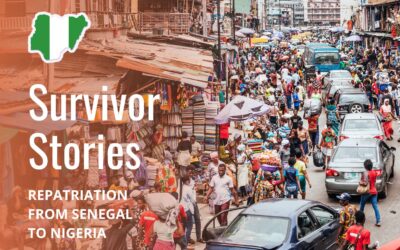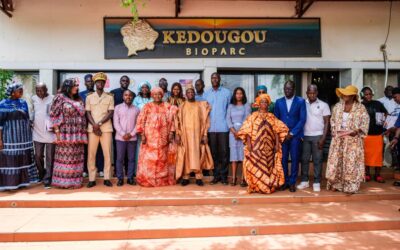In Senegal, we are collaborating with the Center on Human Trafficking Research & Outreach (CenHTRO) at the University of Georgia, two civil society organizations, law enforcement, and other government agencies to combat severe sex trafficking in the Kedougou Region. This area, driven by artisanal gold mining activities, has seen a rise in demand for commercial sex, consequently increasing the occurrence of sex trafficking. To address this critical issue, we have trained community members to form Community Vigilance Committees (CVCs). These committees function as trained spotters who identify potentially exploitative situations and alert law enforcement. They also serve as community awareness ambassadors, educating their communities about the dangers of modern slavery and how to recognize hazardous conditions.
Free the Slaves (FTS) coordinates with CVCs, law enforcement, and organizations providing
shelter care to help victims escape trafficking, offer trauma-informed care, and other essential rehabilitation services. After receiving shelter care services, survivors are repatriated to their home countries. In this project, most women are repatriated to their homes in Nigeria.
Recently, Free the Slaves West Africa Director Issa Saka traveled to Nigeria to connect with our partners at the Emmanuel World Children Foundation and some of the survivors who have returned home over the course of the project.

Issa’s Report: A Beacon of Hope
From the group of seven girls we met, one constant emerged: a boost in self-esteem, radiant smiles, and a great deal of pride in managing their own destinies.
From Asaba to Onitsha, Osungbe to Ole, Ugeli to Euremukokoareh, Ubongo Warri to Ugbontor, Ugbanke to Benin, and finally to Akure, we encountered survivors whose resilience and joy belied the horrors they experienced in Kedougou. While the trauma and stigma are not entirely gone, the joy they radiate is a hopeful sign for their futures.
They all reported a positive change in how their loved ones perceive them, and even the language they use has evolved. Precious*, now a proud owner of her boutique, shared, “Today, I’m called Madame, and people show me a lot of respect. I have my own business, and I can provide for what I need.”
Similarly, Blessing*, outside her hairdressing salon, expressed her success and how she wished her mother were alive to witness it. She mentioned the recognition she has earned in her community, to the point where other hairdressers exhibit jealousy. When asked about the lack of a signboard for her salon, she confidently responded that she was planning to put one up soon.
The same enthusiasm and pride were evident when we met Maria*, who is training to become a pharmacist’s assistant. She proudly displayed her new role, noting the increased respect she receives now that she works in the pharmacy.
We also met Lydia*, Junia*, and Rashel*, who are respectively pursuing vocational training in hairdressing, tailoring, and makeup/interior decoration. Their joy was palpable, especially when reunited with their companion at the Emmanuel World Children Foundation, and they confirmed their parents’ pride and acceptance of their return and reintegration into society.
After four days of visiting and meeting with these survivors, it was heartening to see the project’s impact on their lives. However, the monitoring visits revealed a need to strengthen the prevention and reintegration packages. Ensuring that training at the shelter is more comprehensive, and economic empowerment kits are more substantial, is crucial for the project’s success.
One significant challenge amidst this joy remains the unwanted pregnancies that some victims have returned with from Kedougou. This presents care challenges for the victims and the NGO Emmanuel due to budgetary and health constraints.
The journey was arduous and challenging, with travel on poorly maintained roads and navigating villages late into the night, but it was worth every effort.
*Names changed for privacy
These activities are funded by the U.S. Department of State Office to Monitor and Combat Trafficking in Persons. The opinions, findings, and conclusions therein are those of the author[s] and do not necessarily reflect those of the United States Department of State.




